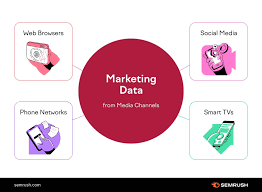The Importance of Marketing Data in Today’s Business Landscape
In the fast-paced and ever-evolving world of business, the role of marketing data has become more crucial than ever. Marketing data refers to the information and insights gathered through various channels and sources that help businesses understand their customers, market trends, and the effectiveness of their marketing strategies.
With the rise of digital marketing, businesses now have access to a wealth of data that can provide valuable insights into consumer behaviour, preferences, and interactions with brands. By analysing this data effectively, businesses can make informed decisions, tailor their marketing efforts to target specific audiences, and ultimately drive better results.
Marketing data allows businesses to track key performance indicators (KPIs), measure the success of their campaigns, and identify areas for improvement. By leveraging data analytics tools and techniques, businesses can gain a deeper understanding of their target market, identify emerging trends, and stay ahead of the competition.
Furthermore, marketing data plays a crucial role in personalising customer experiences. By collecting and analysing customer data, businesses can create targeted marketing campaigns that resonate with individual preferences and needs. This not only enhances customer engagement but also fosters long-term loyalty and brand advocacy.
In conclusion, marketing data is a powerful tool that can help businesses navigate the complexities of today’s business landscape. By harnessing the insights provided by marketing data, businesses can make smarter decisions, drive growth, and build lasting relationships with their customers.
7 Essential Tips for Harnessing Marketing Data Effectively
- 1. Ensure data accuracy by regularly updating and cleaning your database.
- 2. Utilise data analytics tools to gain valuable insights into customer behaviour and trends.
- 3. Segment your audience based on demographics, preferences, and behaviour for targeted marketing campaigns.
- 4. Implement A/B testing to optimize marketing strategies and improve campaign performance.
- 5. Monitor key performance indicators (KPIs) to track the effectiveness of your marketing efforts.
- 6. Respect data privacy laws and regulations when collecting and using customer information.
- 7. Continuously evaluate and adapt your marketing data strategies based on performance metrics and feedback.
1. Ensure data accuracy by regularly updating and cleaning your database.
To maximise the effectiveness of your marketing efforts, it is essential to ensure data accuracy by regularly updating and cleaning your database. By keeping your data up-to-date and eliminating any inconsistencies or errors, you can enhance the reliability of your insights and decision-making processes. Regular maintenance of your database not only improves the quality of your marketing data but also helps you target the right audience more effectively, leading to better outcomes for your campaigns.
2. Utilise data analytics tools to gain valuable insights into customer behaviour and trends.
To enhance your marketing strategy, it is essential to leverage data analytics tools effectively. By utilising these tools, you can delve deep into customer behaviour and trends, gaining valuable insights that can inform your decision-making process. Understanding how customers interact with your brand and identifying emerging trends in the market allows you to tailor your marketing efforts towards targeted audiences, ultimately driving better results and fostering long-term relationships with your customers.
3. Segment your audience based on demographics, preferences, and behaviour for targeted marketing campaigns.
Segmenting your audience based on demographics, preferences, and behaviour is a crucial tip in leveraging marketing data effectively. By dividing your audience into distinct groups, you can tailor your marketing campaigns to target specific segments with relevant messaging and offers. Understanding the unique characteristics and needs of each segment allows you to create more personalised and impactful marketing strategies that resonate with your audience, ultimately leading to higher engagement and conversion rates.
4. Implement A/B testing to optimize marketing strategies and improve campaign performance.
Implementing A/B testing is a valuable tip in leveraging marketing data to optimise strategies and enhance campaign performance. By conducting A/B tests, businesses can compare different versions of their marketing materials or strategies to determine which one resonates better with their target audience. This data-driven approach allows businesses to make informed decisions based on real-time results, leading to more effective and efficient marketing campaigns. A/B testing not only helps in identifying the most successful tactics but also enables continuous improvement and refinement of marketing strategies for better overall performance and results.
5. Monitor key performance indicators (KPIs) to track the effectiveness of your marketing efforts.
Monitoring key performance indicators (KPIs) is essential for evaluating the success and impact of your marketing strategies. By tracking specific metrics such as conversion rates, website traffic, engagement levels, and ROI, you can gain valuable insights into the effectiveness of your marketing efforts. KPIs provide a clear indication of whether your campaigns are meeting their objectives and help you make data-driven decisions to optimise performance and achieve your business goals. Regularly monitoring KPIs allows you to identify trends, measure progress, and make necessary adjustments to ensure that your marketing efforts are delivering the desired results.
6. Respect data privacy laws and regulations when collecting and using customer information.
It is crucial for businesses to uphold data privacy laws and regulations when collecting and utilising customer information. Respecting data privacy not only ensures legal compliance but also builds trust with customers. By being transparent about how customer data is collected, stored, and used, businesses can demonstrate their commitment to protecting individuals’ privacy rights. Prioritising data privacy safeguards not only the reputation of the business but also fosters a positive relationship with customers based on trust and integrity.
7. Continuously evaluate and adapt your marketing data strategies based on performance metrics and feedback.
To maximise the effectiveness of your marketing data strategies, it is essential to continuously evaluate and adapt based on performance metrics and feedback. By regularly monitoring key performance indicators and gathering feedback from your campaigns, you can identify what is working well and what areas need improvement. This iterative approach allows you to refine your strategies, target your audience more effectively, and ultimately achieve better results in your marketing efforts.
